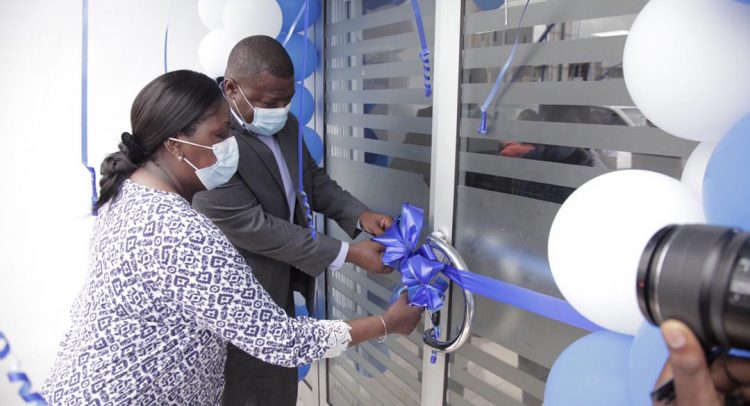Esther Kiraga with Tetteh Padi, cutting the tap to officially open the center.
United Nations High Commission for Refugees (UNHCR), the UN Refugee Agency, has opened the Refugee Community Center to promote and enhance the socio-economic integration of immigrants in the country.
The Center, located in Accra, will among other activities support the building of leadership skills of refugees and empower them in line with community-based protection principles.
It will also serve as a venue for refugee meetings, functions and event, and a center to showcase refugee’s contribution and promote peaceful coexistence.
The opening of the center formed part of the commemoration of the 2021 World Refugee Day marked on June 20 with the themed, “Together we heal, learn and shine – Inclusion in health, education and sport.”
World Refugee Day, is set aside to acknowledge the experiences of the millions of people forced to flee violence and persecution and to celebrate the fact that, with help from welcoming communities and kind neighbors, people can find the strength to heal, rebuild and even thrive.
UNHCR Country Representative, Esther Kiragu in her remarks at the opening of the center said the refugee agency is seeing more people forced to flee their homes than ever before.
“At the end of 2020, over 80 million people were seeking refuge – either across borders or within their own country. This is double the number from a decade ago. These numbers are overwhelming, as are the wars, conflict and persecution that plague our world and force people from their homes,” she said.
She said the Covid-19 Pandemic which has abated in some parts of the world continues to rage in others putting a strain on health care, schools and our communities while exposing social and economic inequalities and devastated economies.
“But the pandemic has also taught us that we are stronger when we stand together. We have all had to do our part to keep each other safe.
Right here in Ghana, UNHCR partnered with Abrantie the Gentleman, a fashion designer who is also one of our High-Level Influencers to produce to train refugees who produced over 35,000 reusable face masks which were distributed to refugees in camps and urban areas as well as to the hosting communities. This was part of their contribution in helping combat the pandemic,” she stated.
She said the UN Agency will continue to push for the inclusion of forcibly displaced and stateless people – whether in national COVID-19 vaccination campaigns, economic relief packages, or education plans.
“This year, on World Refugee Day, we call on people to include the forcibly displaced and stateless in our communities and their lives. We’ve chosen to focus on health care, education and sport. Health care because we all need to fight the pandemic.
Education because of the millions of children whose education was interrupted by the pandemic. And sport in honors of the upcoming Olympic Games and the power of sport to transcend language and nationality to bring people together. Given the chance, refugees will continue to contribute to a stronger, safer and more vibrant world. Together we heal, learn and shine,” she said.
The Ghana Refugee Board, Executive Secretary, Tetteh Padi, said Ghana’s asylum seeker and refugee population to estimated at 14,000 out of which 50 percent are in refugee camps while the reminder lived among communities.
He said many refugees come with their skills which host countries or communities benefit from adding that since the pandemic the UNHCR and its partners completed project worth over GH 7m including police station, accommodation specifically for female police officers to ensure gender balance in discharge of duties, isolation centers for camps and schools, ICT centers.
Mr Padi said the government was making significant contribution to the wellbeing of refugees by including them in national social programme like the NHIS and the education system.
He said the board has through livelihood activities empowered refugees to help them integrate into society without engaging in negative coping activities.
By Jamila Akweley Okertchiri

